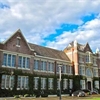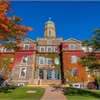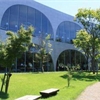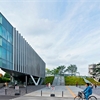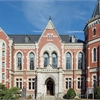2023 Study in Germany the latest commonly used concepts and vocabulary introduction 4350
 Rieter University,The first batch of overseas study institutions certified by the Ministry of Education,Accredited by the world's top ICEF Education Exhibiting Organization (Screened Agency),Member of the National Overseas Study Agency Service Alliance (COSSA),Member of Beijing Overseas Study Service Industry Association (BOSSA),China Education Association for International Exchange self-funded study abroad intermediary service branch director unit,More than 10 years of experience in overseas study and immigration services,We have helped thousands of students achieve their dreams of studying abroad and finding jobs。
Rieter University,The first batch of overseas study institutions certified by the Ministry of Education,Accredited by the world's top ICEF Education Exhibiting Organization (Screened Agency),Member of the National Overseas Study Agency Service Alliance (COSSA),Member of Beijing Overseas Study Service Industry Association (BOSSA),China Education Association for International Exchange self-funded study abroad intermediary service branch director unit,More than 10 years of experience in overseas study and immigration services,We have helped thousands of students achieve their dreams of studying abroad and finding jobs。
If you have any questions about studying abroad and working abroad, please call us 022-2328-9071/9075
Campus life
Council of University Students (AStA)
The University Council is the representative body of university students and is elected annually by the Student Parliament。Representatives of the University Council, most of whom belong to various political parties in Germany, participate in university politics and have different advisory offices。
Large classroom (Audimax)
The Latin "Auditorium Maximum", referred to as Audimax, is the largest classroom in the university, which has many uses, including large cross-professional classes, activities, and student conferences。
Intensive courses (Blockveranstaltungen)
Generally speaking, during the semester, seminars and large classes are once a week, "a long stream of water"。On the other hand, intensive courses are concentrated time, such as a weekend or a week during a vacation, and teach everything in one breath。
Campus (Campus)
In most countries in the world, a campus is a closed university park, where all the departments of a university are located on campus。In Germany, university teaching buildings, administrative buildings, and various departments are often all over the city, especially the universities with a long history, with the passage of time, the development and expansion, but the original land area is not enough, so they have to "see the needle" in the city.。
Credit Points
Credit in German is called "Leistungspunkte" (score points), and you can get it if you have achieved a certain result in college study。To prove completion, you must earn a certain number of credits。One credit is equivalent to about 30 work hours。
Delay c.t. / No delay s.t.
These abbreviations often appear in the course directory (Vorlesungsverzeichnis), indicating the start time of the course。Germans were originally famous for being punctual, but they also tend to schedule a certain amount of lateness in advance before the start of a big class or seminar, which is the so-called "college quarter", meaning that the real class time is the given hour time plus a quarter of an hour, note the abbreviation c.t.Latin cum tempore (with delay: a quarter of an hour)。s.t. The sine tempore means that the class starts exactly on the hour as written。
Cancellation of student registration (Exmatrikulation)
At the beginning of each semester, students must go to the school to register for returning to school. If they exceed the scheduled period, they will be cancelled. Generally speaking, they will not be able to continue studying in this university。Graduates must cancel their enrollment, that is, formally drop out, but the rules vary from school to school。
Association of Students of the Same Profession (Fachschaft)
All students of the same major form a federation of students of the same major, and the Fachschaftsrat, or representative, is responsible for protecting everyone's interests。Union representatives are also responsible for taking care of new students, informing them about the major and helping them develop their own class schedule。
Fakultat
Units of teaching, research and administration that belong to the same area of knowledge are called departments in universities。Most large comprehensive universities have departments of medicine, philosophy, and mathematics and natural sciences。The sub-units of the department are the Institutes or faculties, each of which has a specific specialization。Each institute is subdivided into different lectures, each chaired by a chair professor。
Basic Course/Specialized Course (Grundstudium/Hauptstudium)
Before the introduction of the bachelor and master system, each study was divided into two stages: basic courses and specialized courses。At the foundation level, basic knowledge is taught and academic performance is tested through mid-term examinations (Zwischenprufung or Vordiplom)。Entering the professional course stage, the course content began to professionalize。Because some majors in Germany are still completed by Diplom (German Master of Technology), these majors still maintain the basic course stage and professional course stage。
Assistance in times of distress - psychotherapy and spiritual care
It is precisely foreign students who often have a lot of difficulties in adapting to study at German universities。Perhaps unlike at home, in German universities, you have to worry about a lot of things, organize them, and use a foreign language。The dropout rate of foreign students is also quite high due to economic difficulties。Many universities offer help and support to foreign students as soon as they start school。If you can't solve the problem, whether it is because of classmates, professors, or living in a foreign country, you can get more help, such as going to a psychological counseling center set up by the university。The Christian Church also has a college church at the university to provide spiritual help to students。
Job agency for college students
If you want to pick up odd jobs while studying, the College Student Council (AStA) job agency can help。Companies and private individuals looking for student workers will greet job agencies, which will then assign jobs to interested students。The agency also introduces permanent jobs。
Certificate of achievement, or "Schein"
If you have successfully completed a course, you will get a "certificate" to prove it, with the name of the course and, if any, grades or credits。
Student number (Matrikelnummer)
Each college student is given a school roster number, known as a student number。This student number is used for authentication and will appear on many documents。
Dining Hall (Mensa)
The university canteen is called Mensa, where students can eat for a small fee。The student canteen is run by the Department of Student Services。The variety of food is somewhat related to the size of the university。Small private universities often do not have their own cafeterias。
Modules (Modul)
Several courses in the same professional field form a module, which means that a module is a set of complete learning units。At the end of the module study, there is an exam, which means that there is an exam in the course of the study, and the results of each module exam will finally appear on the graduation transcript。Each course under the module has a weekly class hour (SWS), which means the class time per week in each semester。2 class hours per week means that the class has two 45-minute periods per week。Over the course of the semester, two class hours per week are generally equivalent to 30 hours of actual teaching time。A certain number of lessons per week must be accumulated throughout the course and must generally be recorded in the Studienbuch。
Doctoral Defense (Rigorosum)
In addition to the written doctoral thesis, one must also pass the oral defense, or oral examination, in order to be awarded the doctorate title。
Return to school (Ruckmeldung)
You have to go back to college within a certain period。In most cases, remittance of past semester fees will be sufficient, indicating that you want to continue studying。If you miss the deadline, you may be cancelled。
Bulletin Board (Schwarzes Brett)
In spite of the age of Facebook and Weibo, colleges still have giant bulletin boards filled with housing ads, listings and events。
学期(Semester)
In Germany the school year is divided into two semesters。The summer term runs from April to October and the winter term runs from October to April。
Semester Discount Ticket (Semesterticket)
Students can travel cheaply on public transport with so-called term discount tickets。The money must be remitted along with the semester fees, and the ticket for the next semester will be secured, but some universities in Germany do not offer semester discount tickets。







